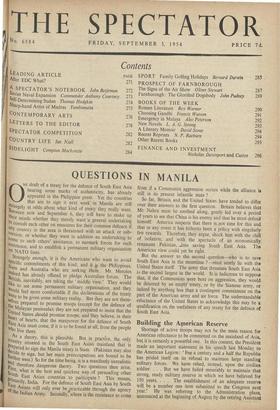QUESTIONS IN MANILA
( Nil draft of a treaty for the defence of South East Asia bearing some marks of authenticity, has already appeared in the Philippine press. Yet the countries that are to sign it next week in Manila are still strangely at odds about what kind of treaty they really want. Between now and September 6, they will have to make up their minds whether they merely want 'a general undertaking to Consult each other on measures for their common defence if any country in the area is threatened with an attack or sub- version; or whether they want in addition an undertaking to Come to each others' assistance, to earmark forces for such assistance, and to establish a permanent military organisation NATO lines.
Strangely enough, it is the Americans who want to avoid specific commitments of this kind; and it 4 the Philippines, Siam and Australia who are seeking them. Mr. Menzies indeed has already offered to pledge Australian forces. The British, inevitably, are taking the middle view.' They would like to see some permanent military organisation, and they Would feel more comfortable if the declarations of the treaty Were to be given some military reality. But they are not them- selves prepared to promise troops (except for the defence of the Malayan peninsula); they are not prepared to insist that the United States should promise troops; and they believe, in their "lean of hearts, that the manpower for the defence of South East Asia must come, if it is to be found at all, from the people who live there.
As a theory, this is plausible. But in practice, the only country situated in the South East Asian mainland that is Prepared to sign the Manila treaty is Siam. (Pakistan may also r=ide to sign, but her main preoccupations are bound to be further west.) So for the time being, it is a manifestly unrealistic d therefore dangerous theory. Two questions then arise. First, what is the best and quickest .way of persuading other SOUS East Asian countries to participate ? This means, Primarily, India. For the defence of South East Asia by South East Asians will only ever betpracticable through the agency of the Indian Army. Secondly, where is the resistance to come from if a Communist aggression occurs while the alliance is still in its present infantile state ?
So far, Britain and the United States have tended to differ over their answers to the first question. Britain believes that Mr. Nehru must be soothed along, gently led over a period of years to see that China is his enemy and that he must defend himself. America suspects that there is not time for this and that in any event it has hitherto been a policy with singularly few rewards. Therefore, they argue, shock him with the chill of isolation, and with the spectacle of an economically renascent Pakistan, -into saving South East Asia. The American view could yet be right.
But the answer to the second question—who is to save South East Asia in the meantime ?—must surely lie with the United States itself. The army that threatens South East Asia i$ the second largest in the world. It is ludicrous to suppose that, if the Communists were bent on aggression, they would be deterred by an empty treaty, or by the Siamese army, or indeed by anything less than a contingent commitment on the part of the American army and air force. The understandable reluctance of the United States to acknowledge this may be a qualification on. the usefulness of any treaty for the defence of South East Asia.


































 Previous page
Previous page